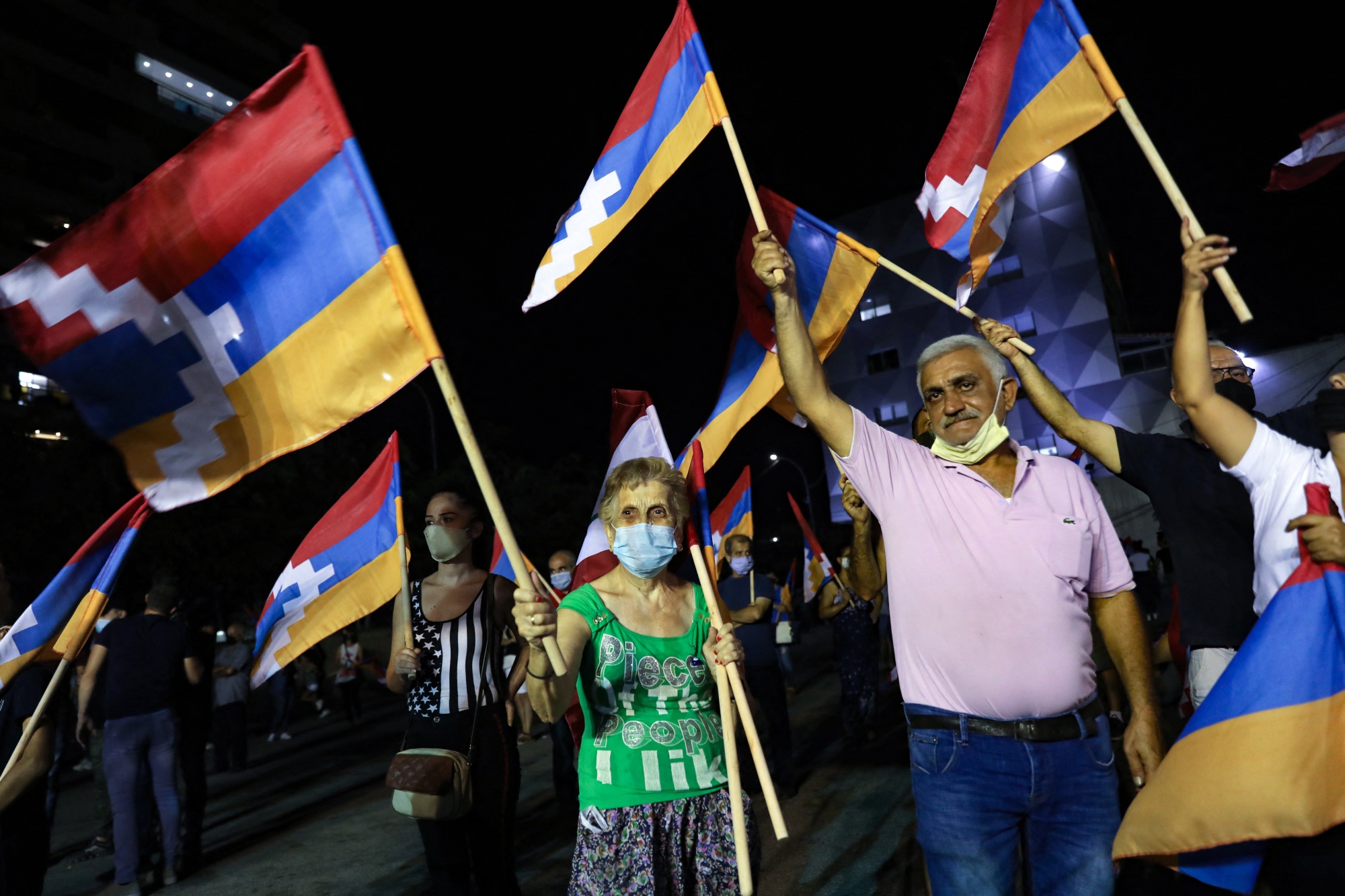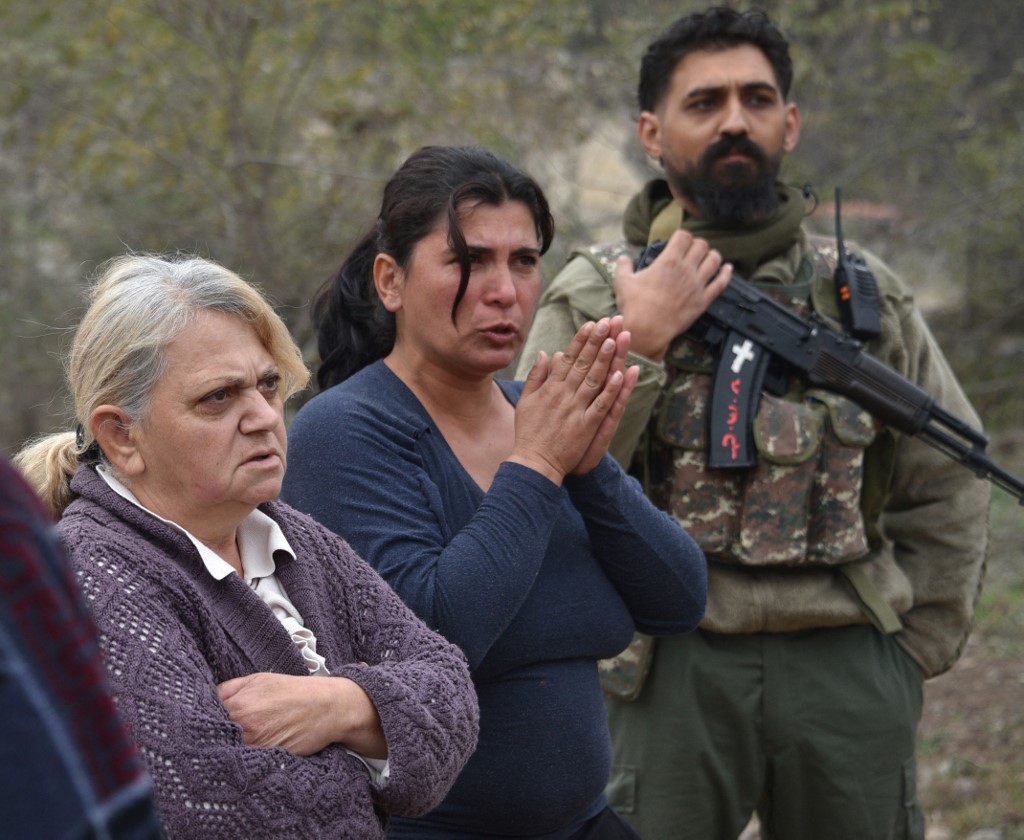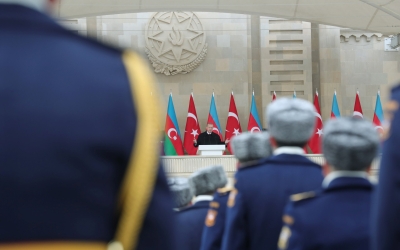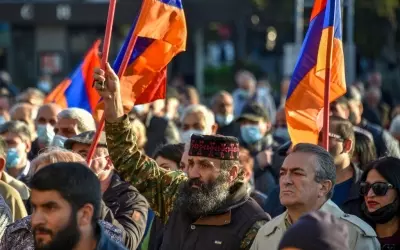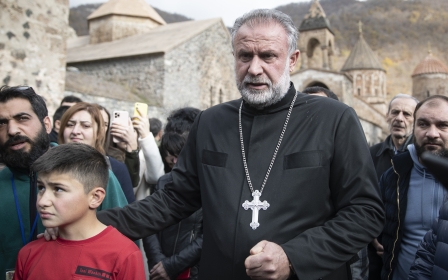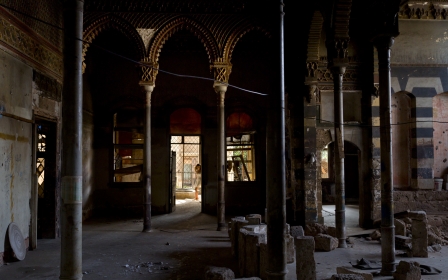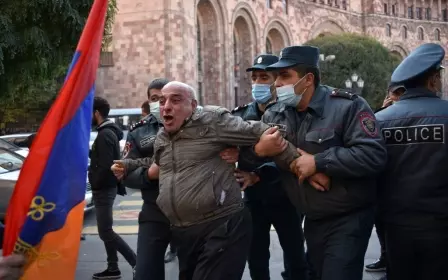Lebanese-Armenian family searches for woman who disappeared in Nagorno-Karabakh
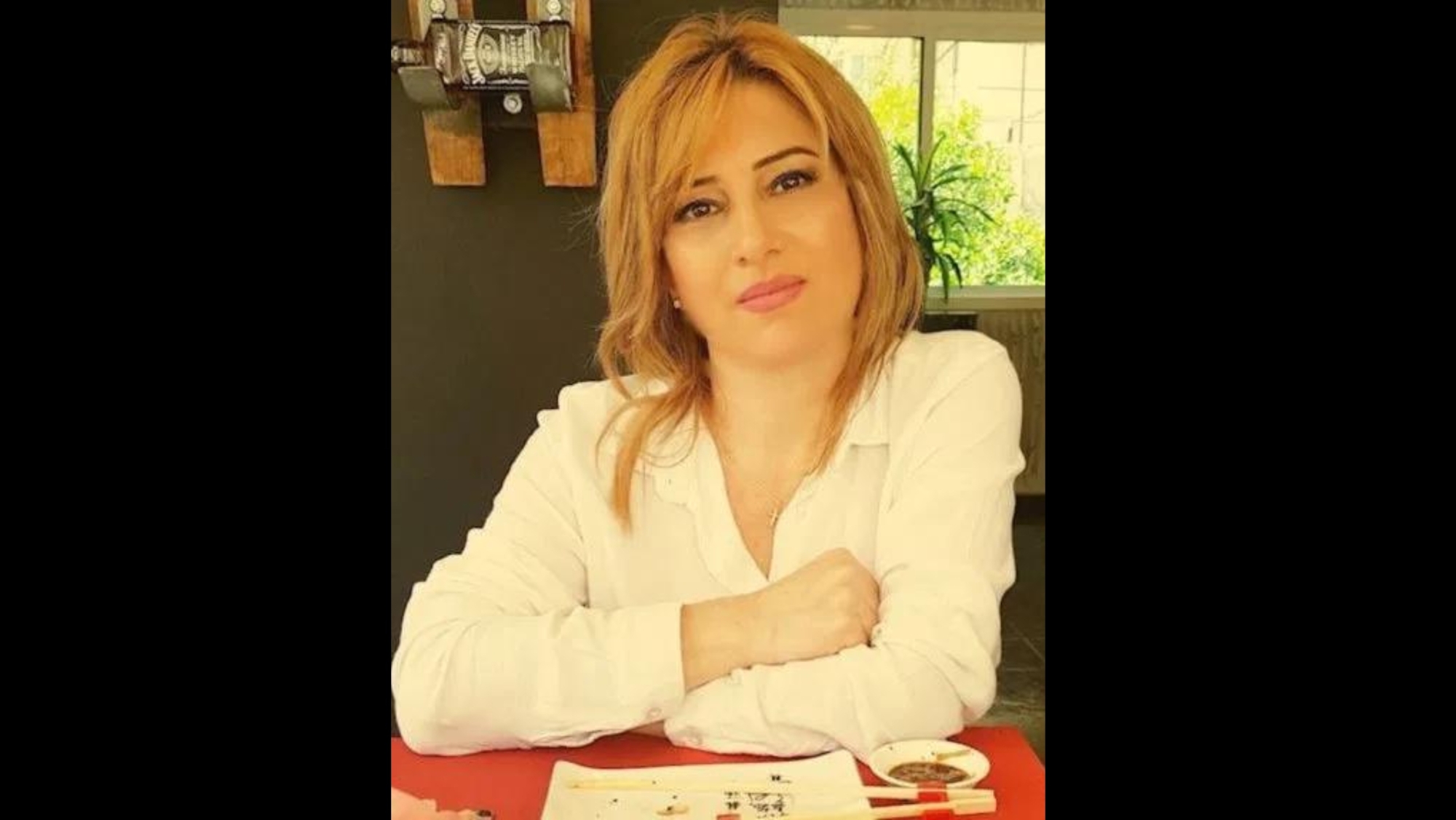
For Maral Najarian, moving to Armenia was supposed to be a dream come true.
The 49-year-old Lebanese-Armenian moved last August from economically shattered Lebanon, hoping to find a better future and financial stability in a place she felt an attachment to.
But on arrival to Yerevan, Armenian authorities encouraged her to sign up to a settlement programme in the disputed area of Nagorno-Karabakh, which soon after she set up home there became embroiled in a ferocious six-week conflict between Armenia and Azerbaijan.
Both sides agreed to a Russian-brokered ceasefire on 10 November - but that same day, Najarian and family friend Viken Euljekian went missing on their way out of Nagorno-Karabakh.
Three months later, her siblings both in Beirut and Yerevan suspect she’s in an Azerbaijani prison and fear for her life - as they accuse authorities both in Lebanon and Armenia of not doing enough to help get her released.
New MEE newsletter: Jerusalem Dispatch
Sign up to get the latest insights and analysis on Israel-Palestine, alongside Turkey Unpacked and other MEE newsletters
From Beirut to Nagorno-Karabakh
Najarian, a hairdresser in Beirut widowed three years ago, had long had plans to relocate with her family and some of her seven siblings to Armenia. She lived in Fanar, around 10km away from the port of Beirut, feeling the impact of the 4 August 2020 explosion there from her home.
Her sister, Ani Najarian, now based in the Armenian capital Yerevan, said that they had plans to leave Lebanon well before the blast, due to the country’s roiling economic crisis.
“We want security. We’ve been living for 30 years in war, humiliation and filth,” Ani told MEE. “We thought we’d go back to our motherland and perhaps we would be taken care of.”
'We’ve been living for 30 years in war, humiliation and filth. We thought we’d go back to our motherland and perhaps we would be taken care of'
- Ani Najarian, Maral's sister
The Lebanese economy was in dire straits well before the Beirut port explosion. For over a year, its currency has continued to lose value, while unemployment and poverty continues to skyrocket. About half the population lives in poverty.
Among the neighbourhoods most affected by the port blast were Mar Mikhael and the semi-industrial Karantina, where many from Lebanon's 150,000-strong ethnically Armenian community reside.
Maral and Ani Najarian left on 25 August for Armenia. Najarian’s family said she had sold the car and left some money for her two adult children before leaving, as they planned on eventually joining her.
A few weeks after arriving in Armenia, the two sisters were able to claim Armenian citizenship. It was there that they discovered a resettlement programme in Nagorno-Karabakh for ethnic Armenians.
The Armenian government in recent years has encouraged nationals to return and resettle in their country of origin. The government's high commissioner of diaspora affairs in late August said they have prepared a "social, economic, educational and healthcare package" for those emigrating from Lebanon.
Over a thousand Lebanese Armenians reportedly relocated to Armenia in the month following the Beirut blast.
But high unemployment and competition in the Armenian capital have driven many to consider moving to Nagorno-Karabakh. The Armenian-backed de-facto Artsakh Republic in the enclave allocated about $85m to support the resettlement of Lebanese Armenians there, similar to past initiatives for Armenians who fled the Syrian conflict years ago.
It was a no-brainer for the Najarians; they applied and received approval.
“They provided developmental aid, housing for the diaspora and so on,” Ani Najarian told MEE. “They wanted to develop a vibrant economy in the area.”
The sisters weren't concerned about the tensions in the region - but did not expect the six-week war that followed.
They moved in mid-September, but luck quickly ran out for them; war broke out 10 days later, before they had even moved into the homes being prepared for them.
The sisters had been staying temporarily at a hotel in the Lachin district - a strategic corridor between Armenia and Nagorno-Karabakh. As air strikes and shelling got closer, they decided to go back to Armenia.
“We went back to Yerevan with a small bag with just a few things, as we were told it would just take a few days for things to cool down,” Ani told MEE.
It took over a month until a Russian-brokered ceasefire came into effect on 10 November.
Accompanied by Eujelkian, a fellow Lebanese-Armenian who had volunteered to fight against Azerbaijani forces for a week, Maral Najarian headed back to the hotel in Karabakh that same day to gather the rest of the family’s belongings.
Ani last heard from her sister while they were close to the border, an hour or so away from the hotel in Lachin.
“The last thing Maral told me was that they were on their way and were in Goris,” in southern Armenia, she said. “There was no communication in Karabakh because power and communications were cut off.”
The pair never returned home, and have not been heard from to this day.
All questions, no answers
Najarian’s family - both in Yerevan and Beirut - say they have been let down by both Lebanese and Armenian authorities.
In Beirut, Najarian’s sister and brother Sossi and Vartan submitted a report to the Lebanese Foreign Ministry on 17 November, and haven’t heard back from them since.
“We waited a week because we thought Maral might have been hiding from air strikes,” Vartan Najarian told MEE. “We submitted a statement with everything they asked, and we have heard nothing from them since.”
Both Lebanon’s head of consular affairs, George Abouzeid - to whom the Najarians addressed their statement - and Lebanese caretaker Foreign Minister Charbel Wehbe did not respond to repeated requests for comment from MEE by the time of publication.
Unlike Armenia, Lebanon has diplomatic relations with Azerbaijan and an Azerbaijani embassy near the capital.
MEE also contacted the Azerbaijan embassy in Lebanon for a statement but only got a response after publication.
The Azerbaijani foreign ministry confirmed to MEE that Maral Najarian was arrested alongside Viken Euljekchian, who is held on multiple charges, including "terrorism".
It did not respond to questions about what Najarian was accused of or charged for, and where she is being held.
"At the same time, Najarian Maralle Ohannes, who has an unofficial marriage with Viken Euljekchian, is currently detained in the Republic of Azerbaijan," the foreign ministry said. "All necessary measures have been taken to ensure her safety and medical care."
Needing support
“We are Lebanese. I’m born, raised and still in Lebanon, and I pay my taxes,” Vartan said anxiously. “The moment I need support, the state just ignores me?”
In Yerevan, Ani reached out to the Lebanese embassy, which recommended that their Armenian counterparts handle the case, given that Najarian is bi-national and went missing on Armenian territory.
She also called a handful of Armenian state institutions and ministries to mobilise for Najarian’s return, to no avail.
“Want to know what the joke is?” an outraged Ani said. “You contact the Defence Ministry, the Lebanese embassy, or anyone else and they say, ‘Yes madame, do you have any updates for us?’”
One Armenian MP, Tatevik Hayrapetyan, has called for Najarian’s release in a tweet. She did not respond to repeated inquiries from MEE about Armenia’s efforts to secure her release.
Suspicious Facebook messages
Two weeks after Najarian went missing, on 24 November, the family noticed that her account on Facebook Messenger was online for the first time since the day of her disappearance.
“Someone responded to us in Turkish,” Vartan Najarian told MEE. “I definitely think it was an Azerbaijani soldier.”
MEE obtained screenshots of the exchange, in which the family pleaded to know Najarian’s whereabouts and whether she was alive or in good health. There were no straight answers. The person did not disclose her whereabouts, though they claimed they knew where she was and sent mixed messages about whether she was alive or not.
They asked if the person with Najarian’s phone could send them a recent photo of her, but to no avail.
'We are scared for Maral’s life. What have they done to her to not have a doctor examine her and send us the results to guarantee if she’s okay or not?'
- Ani Najarian, Maral's sister
The Najarians decided to take matters into their own hands and reached out to human rights lawyer Arman Tatoyan, who heads Human Rights Defender of Armenia, a governmental commission.
“I forwarded these messages to our official representative in the European Court of Human Rights,” Tatoyan told MEE. “The Azerbaijanis confirmed to the court that Maral is with them,” without providing further information to the court.
On 2 December, Eujelkian, who went missing with Najarian, was charged by Azerbaijan's State Security Service of “terrorism”, illegal border crossing and the transfer of weapons, and for being part of an illicit armed group.
A video surfaced of Eujelkian speaking in what appears to be a security agency office, saying he took part in the war as a Lebanese mercenary for a $2,500 fee.
Though Najarian was not a combatant, her family worries she might face a similar fate, given her dual citizenship.
“The Lebanese government has no time for us; if they did, they would have brought her in two days. Maral is not a terrorist, nor a combatant,” her sister Sossi told MEE. “We tried to call everyone we can, but we weren’t getting any answers.”
‘Aren’t we Lebanese too?’
Late last month, a former senior official who once headed Armenia’s National Security Service told media that Najarian was among 235 Armenians being held in Gobustan prison, about 70km from Baku, the capital of Azerbaijan. Five have reportedly been handed over to Yerevan since.
Since then, Ani has reached out to the International Committee of the Red Cross (ICRC), asking if they can visit Maral and verify her location and health situation. They haven’t been able to yet, Ani says, insinuating that the Azerbaijani government has obstructed them from doing so.
Poor conditions in Gobustan prison, where a lot of political prisoners are reportedly held, are a key source of concern for international organisations, especially with a Covid-19 outbreak in the facility last August.
The Council of Europe in an October 2017 report said the conditions in Gobustan prison were “unacceptable”, and called for its closure, expressing concerns about reports of “ill-treatment and torture of prisoners”.
A spokesperson for the Council of Europe’s anti-torture committee told MEE that they had visited the prison and other facilities in Azerbaijan in December, but could not disclose their findings before the report was adopted “later this year”.
Almost three months after Najarian’s disappearance, the family feels they have done everything they can - and given rights groups’ reports on detention conditions, they fear the worst.
“We are scared for Maral’s life,” Ani told MEE. “What have they done to her to not have a doctor examine her and send us the results to guarantee if she’s okay or not?”
Lebanese authorities have not issued any statement about Najarian’s detention, but have recently secured the return of eight Lebanese detainees from the United Arab Emirates on 2 February, while three Lebanese seafarers kidnapped by Nigerian pirates were released in late December.
“The Lebanese negotiated and brought them back from Nigeria, and they hugged their families at the airport,” Vartan said angrily. “Aren’t we Lebanese too?”
Middle East Eye delivers independent and unrivalled coverage and analysis of the Middle East, North Africa and beyond. To learn more about republishing this content and the associated fees, please fill out this form. More about MEE can be found here.


